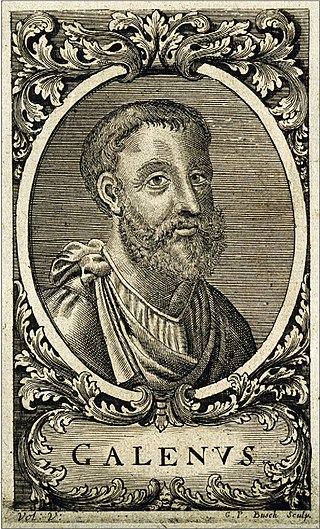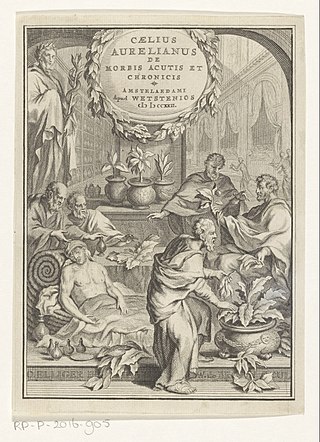Related Research Articles

Aelius Galenus or Claudius Galenus, often anglicized as Galen or Galen of Pergamon, was a Roman and Greek physician, surgeon, and philosopher. Considered to be one of the most accomplished of all medical researchers of antiquity, Galen influenced the development of various scientific disciplines, including anatomy, physiology, pathology, pharmacology, and neurology, as well as philosophy and logic.

The Antonine Plague of AD 165 to 180, also known as the Plague of Galen, was a prolonged and destructive epidemic, which impacted the Roman Empire. It was possibly contracted and spread by soldiers who were returning from campaign in the Near East. Scholars generally believed the plague was smallpox, due to the skin eruptions over the entirety of the body which appeared to be red and black (Horgan), although measles has also been suggested, and recent genetic evidence strongly suggests that the most severe form of smallpox arose in Europe much later. As yet, there is no genetic evidence from the Antonine plague.

The gens Aurelia was a plebeian family at ancient Rome, which flourished from the third century BC to the latest period of the Empire. The first of the Aurelian gens to obtain the consulship was Gaius Aurelius Cotta in 252 BC. From then to the end of the Republic, the Aurelii supplied many distinguished statesmen, before entering a period of relative obscurity under the early emperors. In the latter part of the first century, a family of the Aurelii rose to prominence, obtaining patrician status, and eventually the throne itself. A series of emperors belonged to this family, through birth or adoption, including Marcus Aurelius and the members of the Severan dynasty.

John Antony Cramer, English classical scholar and geographer, was born at Mitlödi in Switzerland.

Caelius Aurelianus of Sicca in Numidia was a Greco-Roman physician and writer on medical topics. He is best known for his translation from Greek to Latin of a work by Soranus of Ephesus, On Acute and Chronic Diseases. He probably flourished in the 5th century, although some place him two or even three centuries earlier. In favour of the later date is the nature of his Latin, which shows a strong tendency to the Romance, and the similarity of his language to that of Cassius Felix, also an African medical writer, who about 450 wrote a short treatise, chiefly based on Galen.

Arethas of Caesarea was Archbishop of Caesarea Mazaca in Cappadocia early in the 10th century, and is considered one of the most scholarly theologians of the Greek Orthodox Church. The codices produced by him, containing his commentaries are credited with preserving many ancient texts, including those of Plato and Marcus Aurelius' "Meditations".
Archigenes, an ancient Greco-Syrian physician, who lived in the 1st and 2nd centuries AD.
Antigenes was the name of a number of people of ancient Greece:

Soranus of Ephesus was a Greek physician. He was born in Ephesus but practiced in Alexandria and subsequently in Rome, and was one of the chief representatives of the Methodic school of medicine. Several of his writings still survive, most notably his four-volume treatise on gynecology, and a Latin translation of his On Acute and Chronic Diseases.
Antipater was a Greek physician and author of a work titled On the Soul, of which the second book is quoted by the Scholiast on Homer, in which he said that the soul increased, diminished, and at last perished with the body; and which may very possibly be the work quoted by Diogenes Laërtius, and commonly attributed to Antipater of Tarsus.
Adamantius was an ancient physician, bearing the title of iatrosophist. Little is known of his personal history, except that he was Jewish by birth, and that he was one of those who fled from Alexandria at the time of the expulsion of the Jews from that city by the Patriarch Cyril of Alexandria in 415. He went to Constantinople, was persuaded to embrace Christianity, apparently by Archbishop Atticus of Constantinople, and then returned to Alexandria.
Philagrius of Epirus was a Greek medical writer from Epirus, who lived after Galen and before Oribasius, and therefore probably in the 3rd century CE. According to the Suda he was a pupil of a physician named Naumachius, and practised his profession chiefly at Thessalonica.
Theognostus the Grammarian was a Byzantine grammarian of the 9th century and the author of Περὶ ὀρθογραφίας, also known as the Κανόνες (Canons), a handbook on spelling. The work, which is based on the works of the earlier grammarians Cyril and Herodian, consists of a series of rules designed to help Byzantine writers use the correct ancient spellings of words whose pronunciation had changed in mediaeval Greek. It is dedicated to the emperor Leo V. Theognostus also wrote a lost work on the rebellion of Euphemius in Sicily in 826–827.
The gens Attia was a plebeian family at Rome, which may be identical with the gens Atia, also sometimes spelled with a double t. This gens is known primarily from two individuals: Publius Attius Atimetus, a physician to Augustus, and another physician of the same name, who probably lived later during the first century AD, and may have been a son of the first. A member of this family rose to the consulship in the early second century, but his career is known entirely from inscriptions.
Amentes was an ancient Greek surgeon, mentioned by Galen as the inventor of some ingenious bandages. Some fragments of the works of a surgeon named Amynias still exist in the manuscript "Collection of Surgical Writers" by Nicetas, and one extract is preserved by Oribasius in the fourth volume of Angelo Mai's collection Classici Auctores e Vaticanis Codicibus. His date is unknown, except that he must have lived in or before the 2nd century AD. He may perhaps be the same person who is said by the Scholiast on Theocritus to have been put to death by Ptolemy II Philadelphus, around 264 BC, for plotting against his life.
John Geometres or Kyriotes, was a Byzantine poet, soldier, and monk. He is one of the main literary figures of the Macedonian Renaissance.
Apollonius of Chalcedon was an ancient Greek Stoic who taught philosophy. He was invited by the Roman emperor Antoninus Pius to come to Rome, for the purpose of instructing his adoptive sons Marcus Aurelius and Lucius Verus in philosophy. Aurelius, within his Meditations, writes of Apollonius favourably. Lucian writes of him:
When Apollonius was appointed professor of philosophy in the Imperial household, Demonax witnessed his departure, attended by a great number of his pupils. 'Why, here is Apollonius with all his Argonauts,' he cried.
Aristocles was a physician of the ancient world whose medicines are several times quoted by one of the physicians named Andromachus. He is also mentioned in the first volume of John Cramer's Anecdota Graeca.
Aristocrates was a grammarian of Ancient Greece who despite being described as a "grammarian" is nevertheless mostly remembered as the source of a remedy for toothache passed down by either the elder or younger Andromachus, and later quoted by medical annalist Galen. Because he was not described as himself being a doctor or scientist, but is quoted by later medical scientists, he is sometimes referred to as an example or practitioner of Ancient Greek folk or traditional medicine.
References
- ↑ Galen, De Compositione Medicamentorum Localium 5.5. vol. xii. p. 892
- ↑ John Cramer, Anecdota graeca e codd. manuscriptis bibliothecae regiae Parisiensis, vol. i. p. 394
![]() This article incorporates text from a publication now in the public domain : Greenhill, William Alexander (1870). "Aurelius". In Smith, William (ed.). Dictionary of Greek and Roman Biography and Mythology . Vol. 1. p. 443.
This article incorporates text from a publication now in the public domain : Greenhill, William Alexander (1870). "Aurelius". In Smith, William (ed.). Dictionary of Greek and Roman Biography and Mythology . Vol. 1. p. 443.